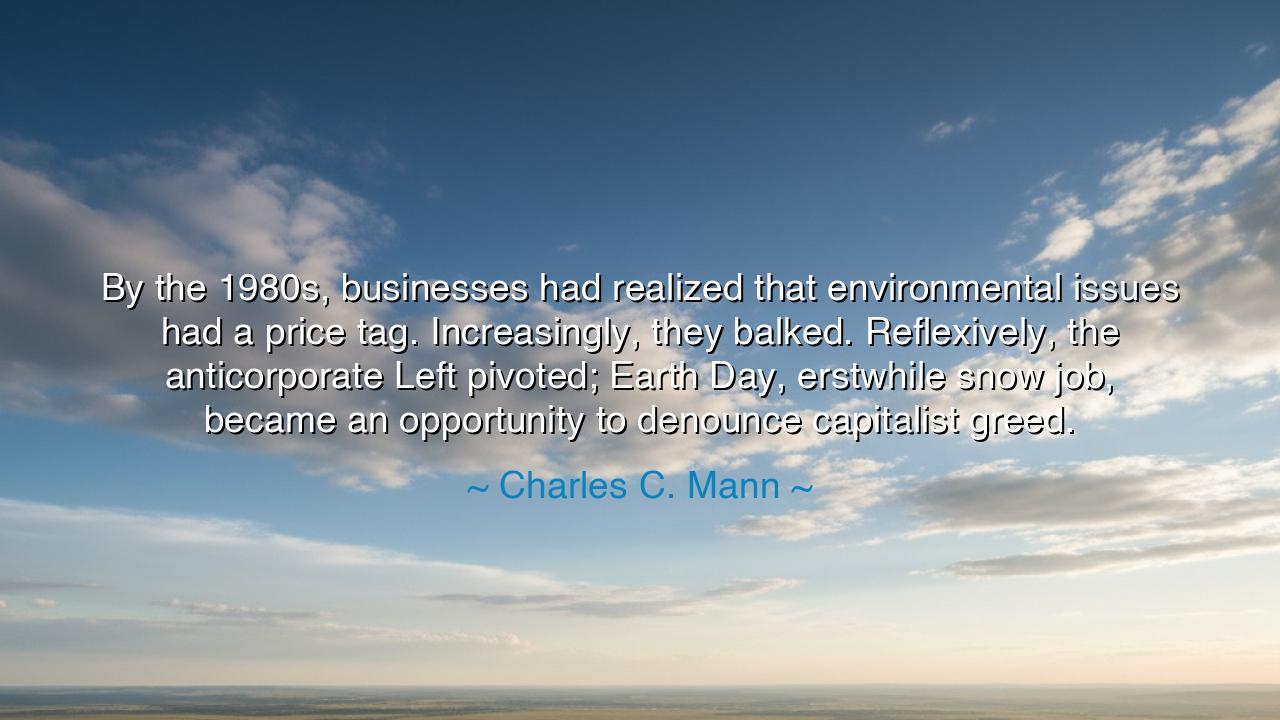
By the 1980s, businesses had realized that environmental issues
By the 1980s, businesses had realized that environmental issues had a price tag. Increasingly, they balked. Reflexively, the anticorporate Left pivoted; Earth Day, erstwhile snow job, became an opportunity to denounce capitalist greed.






Hear the words of Charles C. Mann, a chronicler of history and environment, who declared: “By the 1980s, businesses had realized that environmental issues had a price tag. Increasingly, they balked. Reflexively, the anticorporate Left pivoted; Earth Day, erstwhile snow job, became an opportunity to denounce capitalist greed.” These words unveil a moment of turning, when the struggle for the earth became entangled with the struggle over wealth and power, and when idealism collided with the realities of cost and profit.
The origin of this saying lies in the transformation of the environmental movement in the United States. When Earth Day was first celebrated in 1970, it was a festival of hope, a call for cleaner air, fresher water, and respect for the land. In those days, corporations and politicians alike could embrace its spirit at little cost, offering gestures of support without deep sacrifice. But as the years passed, the true price of protecting the earth became clear. Clean technologies demanded investment; pollution control cut into profits; limits on extraction threatened industries. By the 1980s, the masks fell away, and businesses balked at the burden.
Mann’s words also reveal how conflict sharpened. As corporations resisted, many activists turned more openly against the economic system itself, branding capitalism as the root of exploitation. Thus Earth Day, once a shared ritual, became a battlefield. What had begun as a celebration of unity was transformed into a platform for accusation, where the anticorporate Left denounced the pursuit of profit as the enemy of the planet. From this tension arose a long-lasting divide: between those who believed markets could be harnessed for good, and those who believed markets were the very heart of the problem.
History provides examples of both failure and hope in this struggle. Consider the case of the Love Canal disaster in New York, where a community discovered their homes built atop buried chemical waste. Here, the price tag of neglect was measured in sickness, displacement, and grief. The corporations that once profited could not escape responsibility, and the people demanded justice. Yet consider also the rise of companies that chose another path, investing early in renewable energy and cleaner technologies. These businesses found profit not in destruction but in stewardship, proving that markets need not always be enemies of the earth.
The deeper meaning of Mann’s quote is that whenever the preservation of the planet is weighed against short-term wealth, a struggle will arise. Businesses seek to minimize cost; activists demand justice; governments waver between. It is easy for each side to demonize the other, but the true challenge is harder: to build systems where environmental issues are not external burdens, but central to the measure of prosperity. Until then, Earth Day will remain not only a celebration but also a rebuke.
The lesson for us is plain: we must recognize that the earth does indeed have a price tag, but that price must be paid sooner or later. If not paid in foresight and investment, it will be paid in floods, fires, famine, and loss. It is foolish to delay the cost, for the debt grows larger with every passing year. The wise do not ask, “How can we avoid the cost of protecting nature?” but rather, “How can we pay now, before the bill destroys us?”
And what shall we do in our own lives? Support policies and leaders that require corporations to bear responsibility for their impact. Choose goods and services from those who invest in sustainable practices. Teach children that profit is not evil, but profit without conscience is ruin. Let Earth Day not be a snow job nor merely a protest, but a renewal of our vow to live rightly with the land.
So remember the wisdom of Charles C. Mann: when businesses saw the price tag, they faltered, and when activists saw this, they rose in anger. The conflict was real, yet it need not end in endless strife. If we can join profit with protection, if we can see the earth not as a burden but as the source of all wealth, then Earth Day will again be a festival of hope—not only for a day, but for generations to come.






AAdministratorAdministrator
Welcome, honored guests. Please leave a comment, we will respond soon